
“Through coffee, I can communicate with people.” I discovered a new frontier for a coffee shop after twenty years.
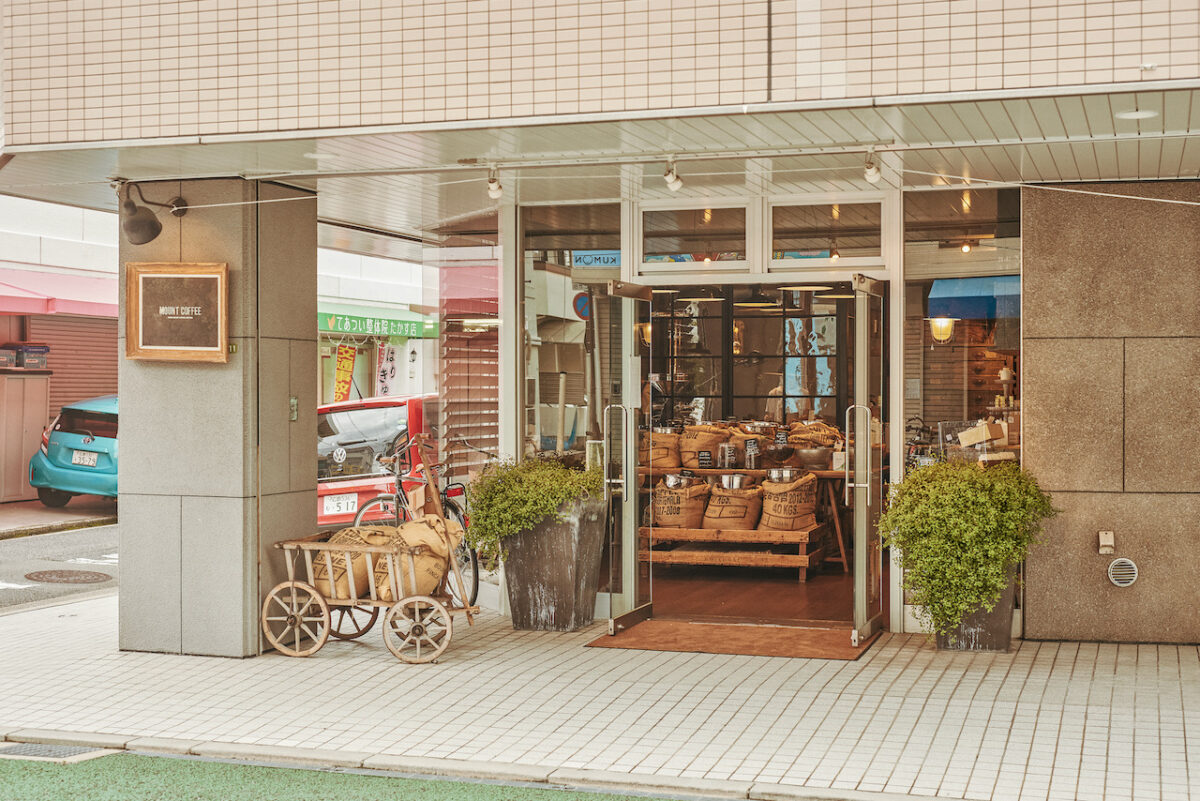
MOUNT COFFEE is a coffee shop that serves coffee roasted in-house located in a shopping district a few kilometers away from the central part of Hiroshima City in Hiroshima Prefecture. Owner Mr. Shohei Yamamoto was fascinated by the Starbucks he visited in Canada when he was nineteen years old, and he started his own coffee shop in 2014 after his experience working at several cafes and coffee shops. He has been roasting coffee wishing to make his store fit in well within the city while at the same time working on new projects from time to time such as publishing free papers and speaking on podcasts. We speak with Mr. Yamamoto to find the story behind his coffee shop.
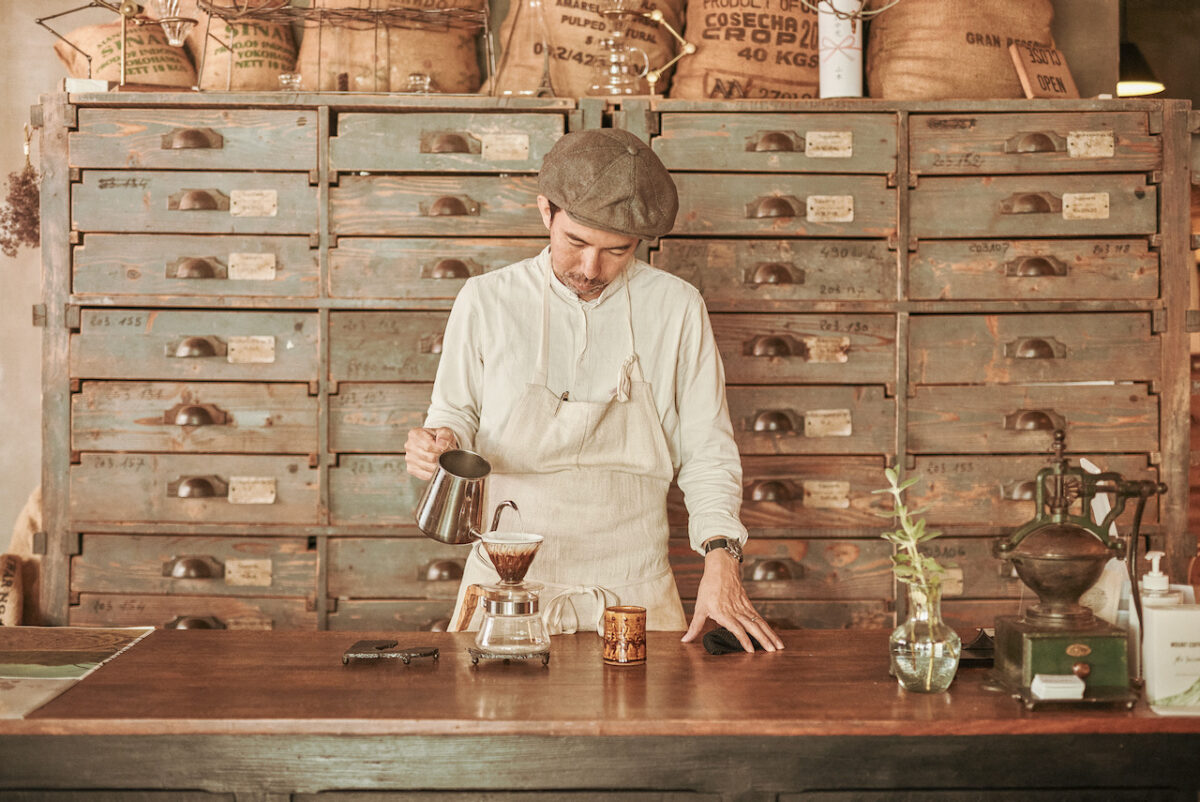
For the things I can’t do, I can just ask others for help.
MOUNT COFFEE, with its concrete walls and ceiling, wood-grained floor, and antique furniture, is a sophisticated space that exudes a mature atmosphere.
“Our store is really cool.”
Yamamoto, the owner of the store, says this without hesitation, but it’s not that he is making us feel uncomfortable with his straightforward confidence. His distinct hunting cap, salt and pepper beard, and well-worn white apron make him look like a craftsman, but when you talk to him, you can feel his friendly character.
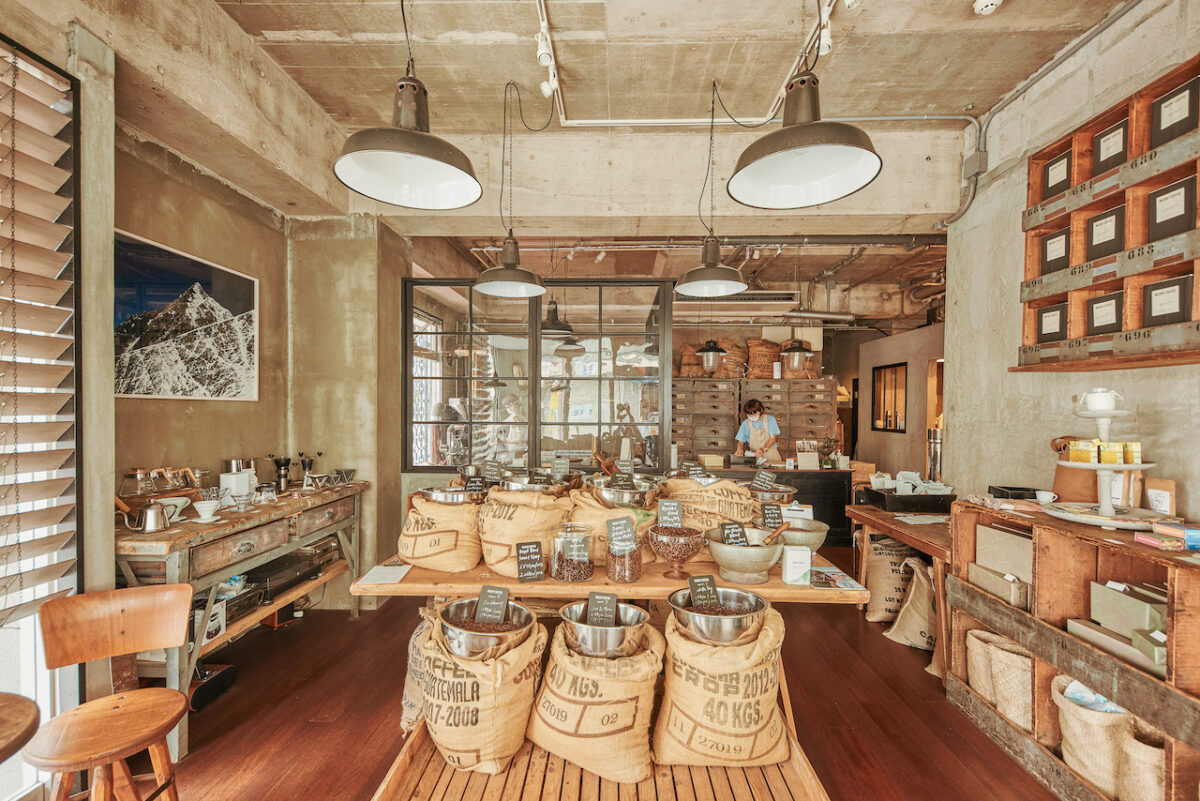
Yamamoto states, “Whether it’s the interior or the design of the store, I asked people who can make cool things to make them for me. I didn’t give my opinion. I think that I have been able to keep the store going for seven years thanks to the amazing people around me just like I also have an amazing shop website thanks to help from amazing people. In other words, I am very good at relying on others. (laughs) I guess it’s a good thing that I don’t have any ‘half-finished skills’ or ‘half-finished pride.’ I’ve always thought that I can leave things to others if it’s not about coffee.”
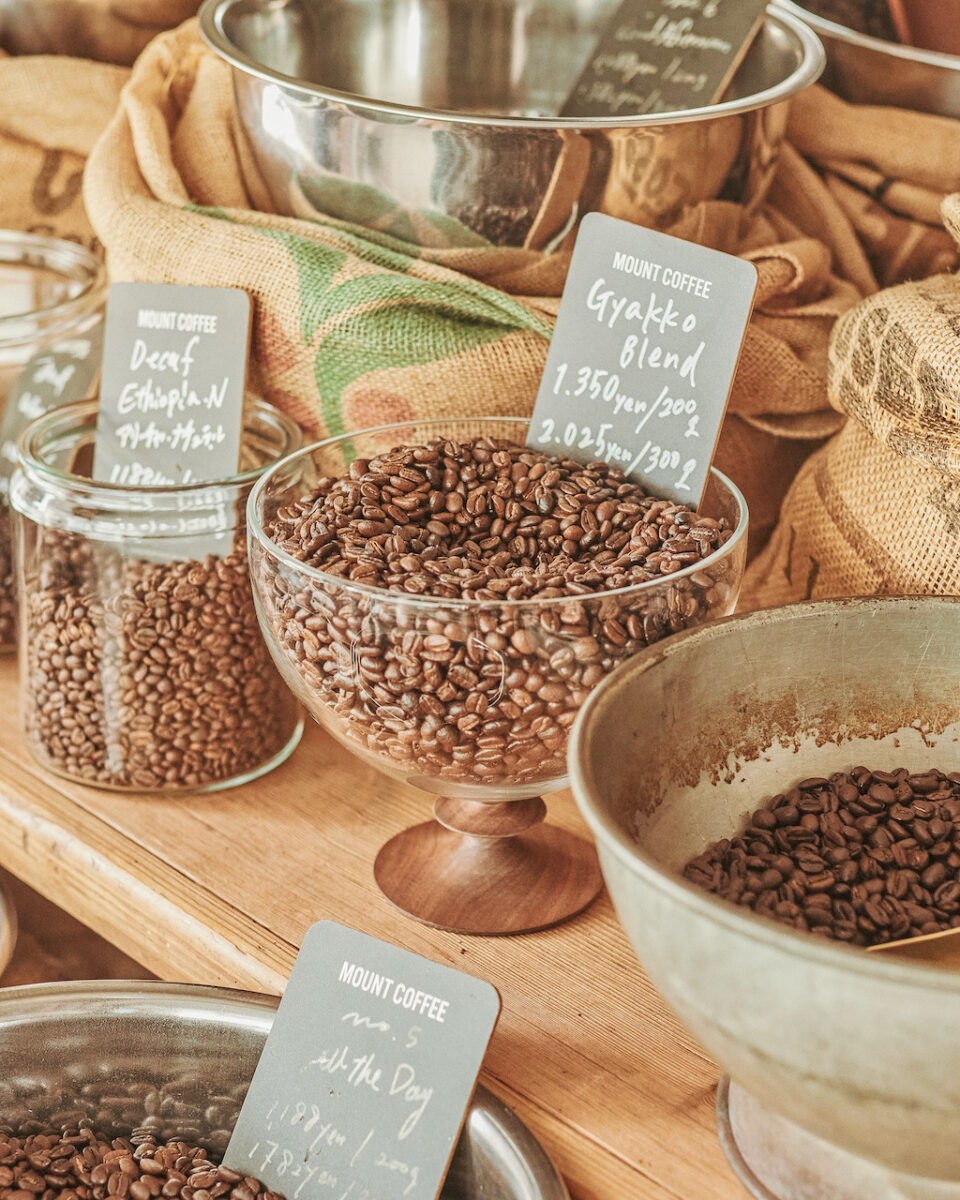
Yamamoto initially had no intention of opening his own coffee shop.
Yamamoto states, “I’ve worked in coffee shops owned by people I thought were unbeatable, and I didn’t think that I could create a store with better taste and coolness than their shops have. I felt that I would be lucky if I could work in a cool and comfortable store.”
“On the other hand, I became convinced that if I wanted to start my own business, I would have to do everything on my own. So, I didn’t have confidence, and I didn’t think I needed it. I think that this anxiety was eased when I met coffee. Coffee itself, grown in a distant foreign land, is a product that I couldn’t deliver to consumers on my own.”
The name of the store, “MOUNT COFFEE” is taken from part of his last name “yama” as a hint which means mountain in Japanese. Such an episode is very typical of Yamamoto. Yamamoto states, “I thought it would be embarrassing to be too particular about the name of the coffee shop, and I guess I always want to be easygoing.”

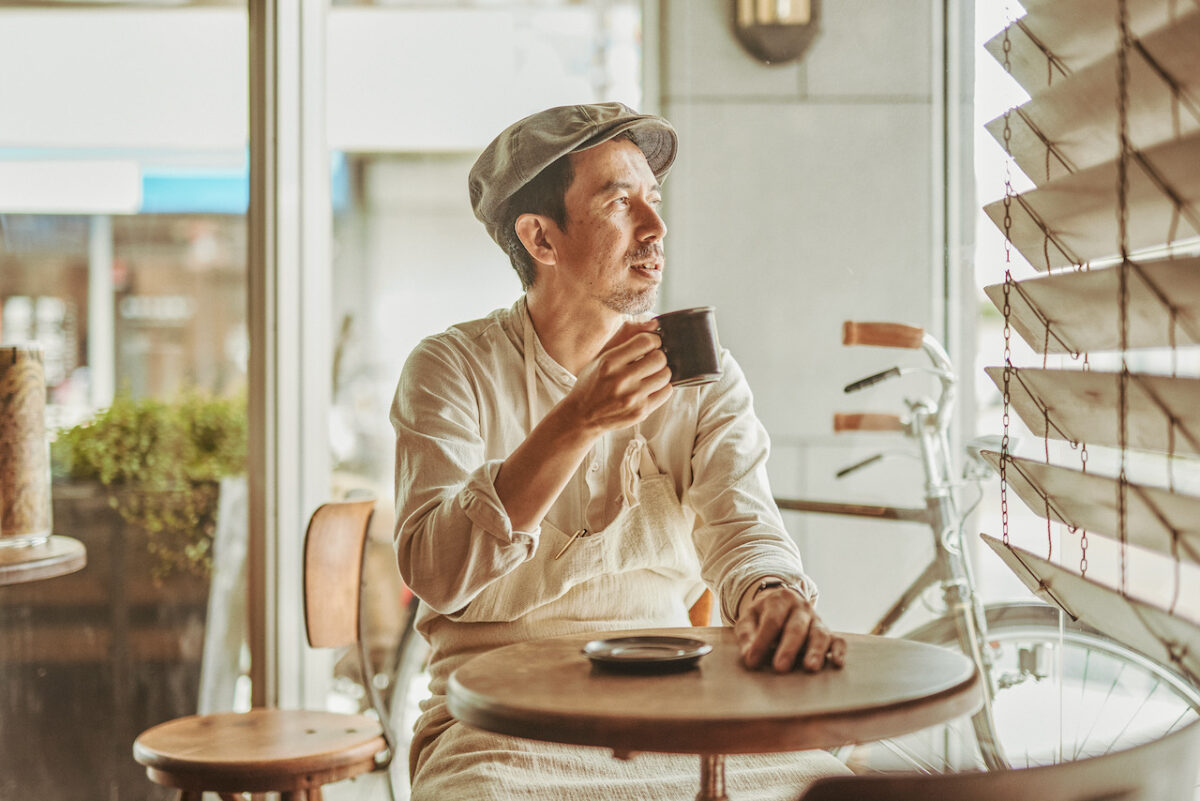
Quality of work that matures as the time goes by.
Yamamoto opened the door to the world of coffee when he was nineteen years old. It was his visit to a Starbucks in Canada on his short study abroad program. Yamamoto was struck by the design of the space, which seemed to reflect the concept of creating a place where people could relax as a third space, and not just a location for drinking coffee.
“It was new to me then to take out coffee from the cafe or get coffee served in paper cups, and I thought it was cool. Growing up in the countryside of Wakayama prefecture in Kansai region of Japan, I didn’t have many opportunities to experience ‘cultural things,’ so that was probably a big factor.”
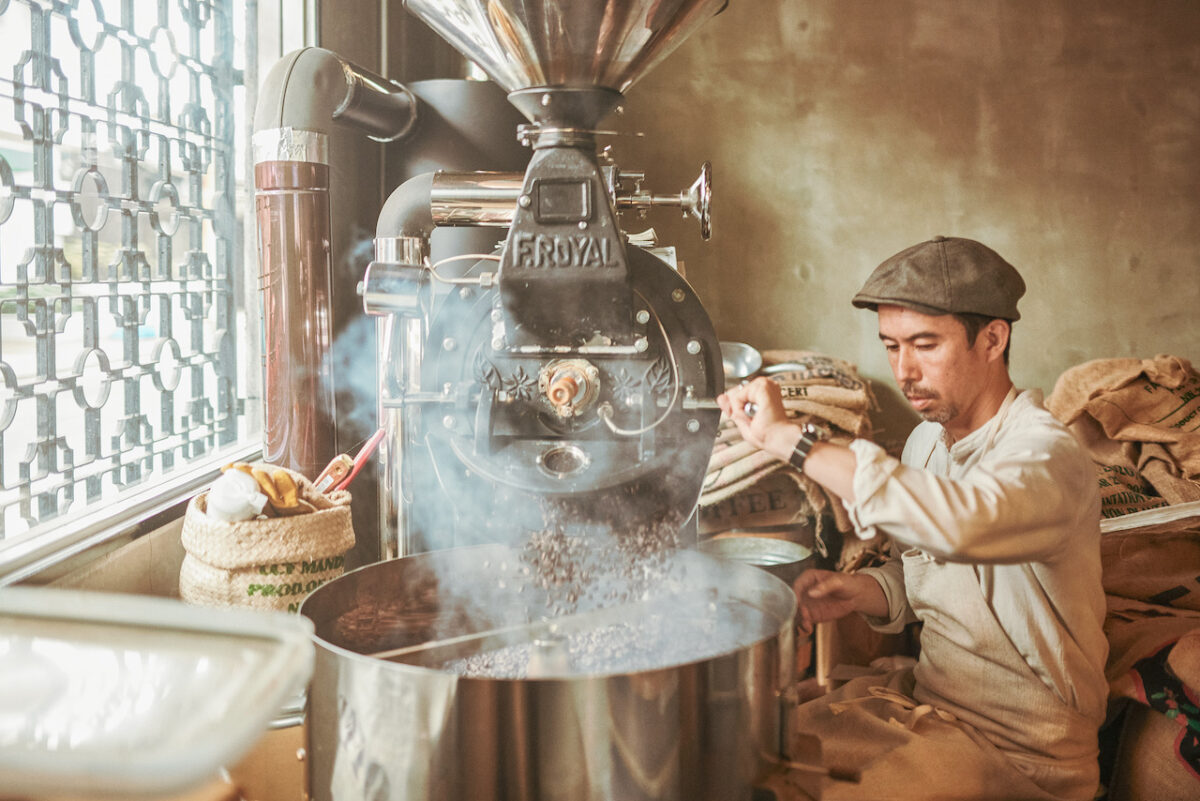
After returning to Japan with his enthusiasm, Yamamoto moved to Hiroshima. He started working part-time at a newly opened Starbucks and at the same time worked part-time at a French restaurant that served coffee roasted in-house.
Yamamoto states, “At that time in the early 2000s, there was a cafe boom of sorts with fashionable cafes springing up in Kobe, Kyoto, and Kamakura in Kanagawa prefecture and the magazine “Cafe-Sweets” was launched in Japan. However, as far as we knew, there were almost no cool shops that sold coffee beans, coffee shops serving coffee roasted in-house, nor coffee shops dealing with specialty coffee. I felt like we were ahead of our time so we were rather proud of the fact that we were doing something that no one else was then.”
While working at Starbucks where he was involved in coffee brewing, and at the French restaurant involved in coffee roasting, Yamamoto realized that working at the shop selling coffee beans was more interesting.
“Restaurants and cafes are largely influenced by trends, and they generally change their ways of doing business every five to ten years. On the other hand, shops selling coffee beans never go out of style, and I thought it would be cool to see that the more the time passes, the more mature the business becomes with more value added to it.”
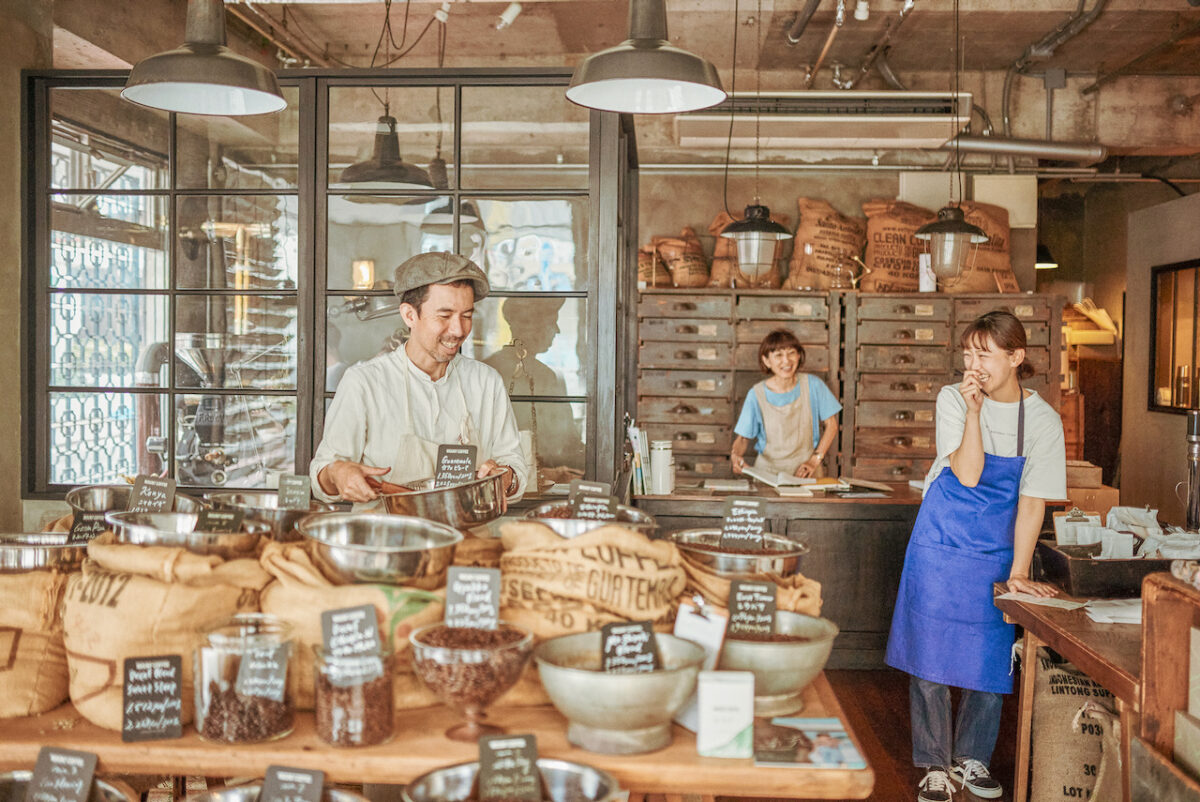
To put down roots in the local community, he decided to open a store on a corner of a local shopping district located a few kilometers away from the central part of Hiroshima City because he valued the economic promise of a shop that could be cultivated over time if it were located in a busy local area.
“I wanted to create a store that would fit in well within the neighborhood. For me, a coffee shop is like a grocery store or a fish shop that you see in a local shopping district. If there are various small shops selling various products in the neighborhood, customers would be satisfied with completing their shopping in the neighborhood and they wouldn’t have to rely on a big chain supermarket. I feel that in that way we can maintain a peaceful world.”
“As for suppliers of green coffee, I want to buy from the suppliers who have established close relationships with the producers, even if the cupping score is a little low, as long as the quality is above a certain level. Related to this idea, I always thought the bakeries and udon noodle shops were so nice because they could use Japanese domestic wheat as their raw ingredient. Coffee production areas are far away from Japan and it’s not easy to go there and meet producers.”

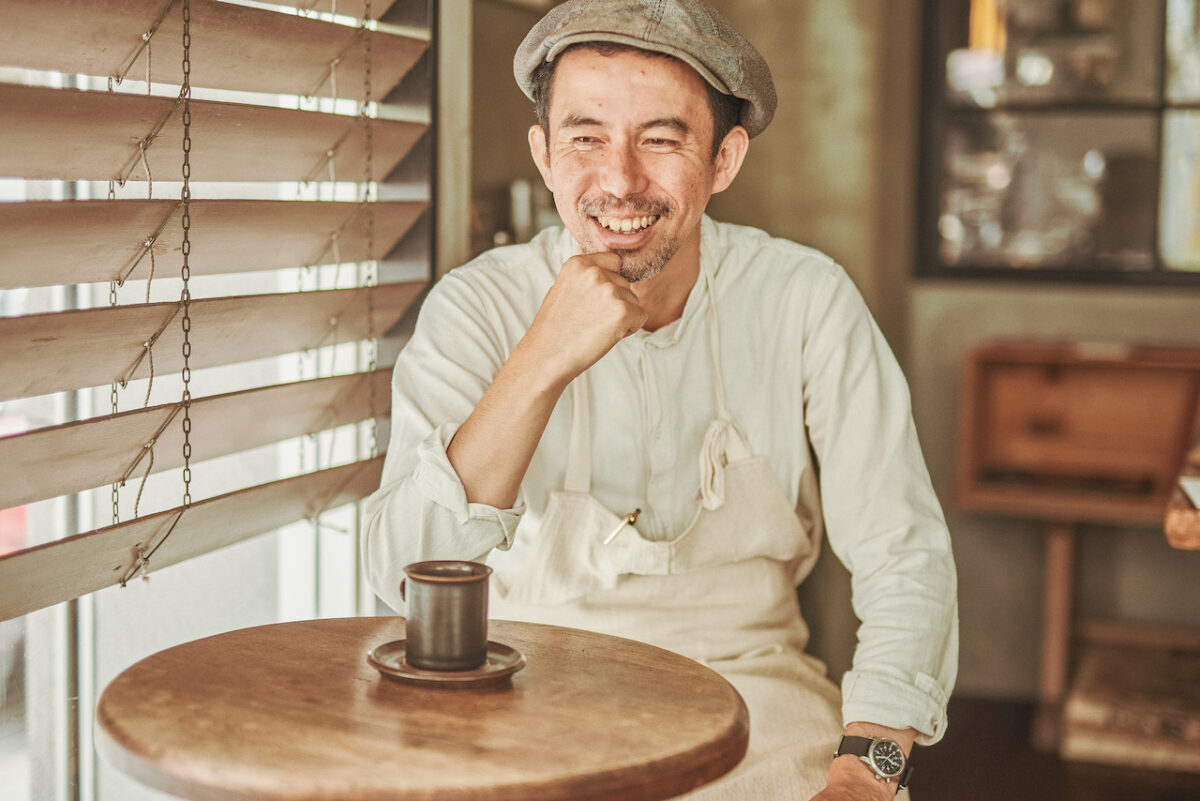
To continue what he wants to do.
For Yamamoto, who was raised by parents who ran their own business, the general expectation of the world that he had to find employment somewhere and work there as a full-fledged employee was not what he thought he would do.
Yamamoto states, “I’ve always gone in the direction that I thought was cool. I don’t think about it in much depth, so when people ask me why I would do that, I don’t know how to answer. I am a human being who just goes with the flow, so people around me would maybe look at me and think I am just being too free and too easy-going. When I was about twenty years old, a cool adult whom I trusted said to me, “Just do what you enjoy because the money will follow you along if you do that.” That advice has encouraged me since to carry on in my life.”
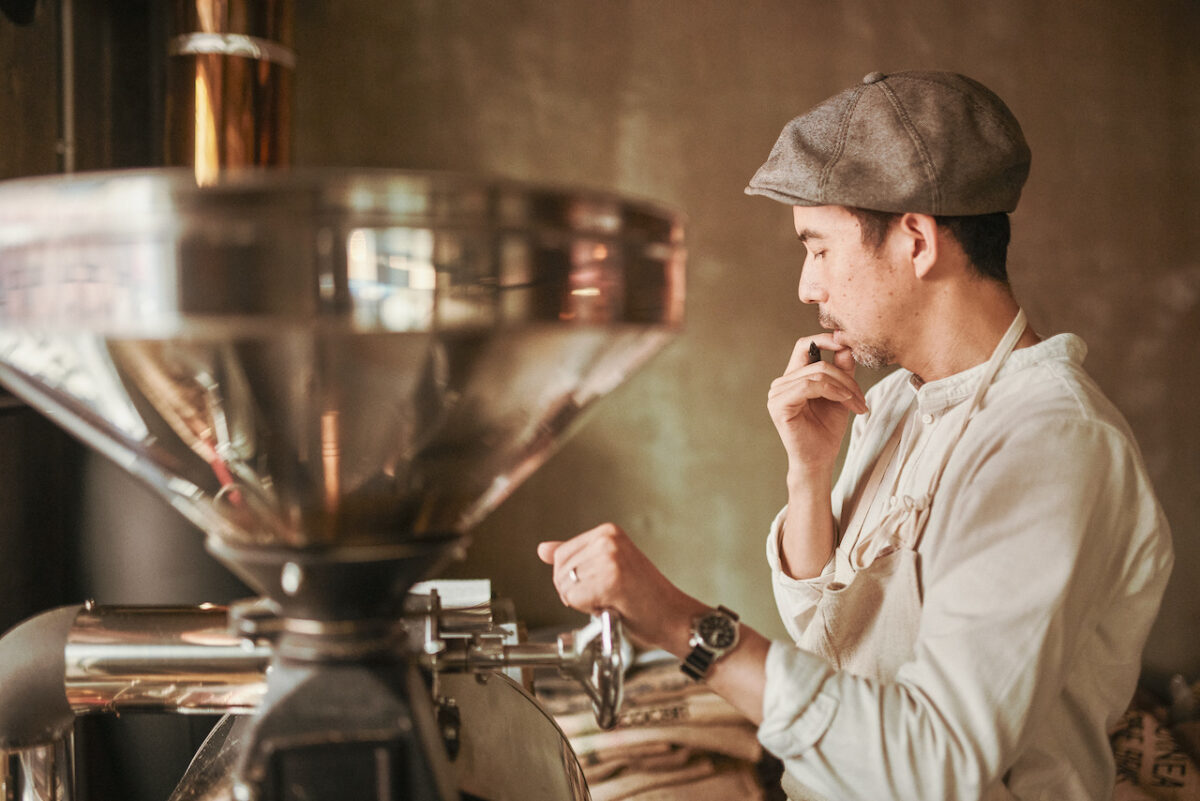
In fact, he says that there were times when he forgot his true self because he was just living in the flow of life.
“After working at the same coffee shop for about eight years, I realized that I had lost track of what my vision was, and that was when I started my own business. As the manager of the second branch of the coffee shop I had worked for eight years, I was in charge of running the store. The work itself was very enjoyable and I had no complaints whatsoever. I wondered whether or not I should stay in such a comfortable place for a long time and decided that maybe I should try something new before I turned thirty-five.”
He pondered if he should start his coffee shop or continue working at the store. After careful thoughts, Yamamoto chose to open his coffee shop, but it wasn’t a choice between the two until he finally made the choice.
Yamamoto states, “It’s just that I am more decisive about the big choices I make but not the small choices I make. I have always wanted to do what I want to do in life. I want to keep running my coffee shop. I don’t mind doing things I don’t want to do as long as I can do them within the areas of coffee.”
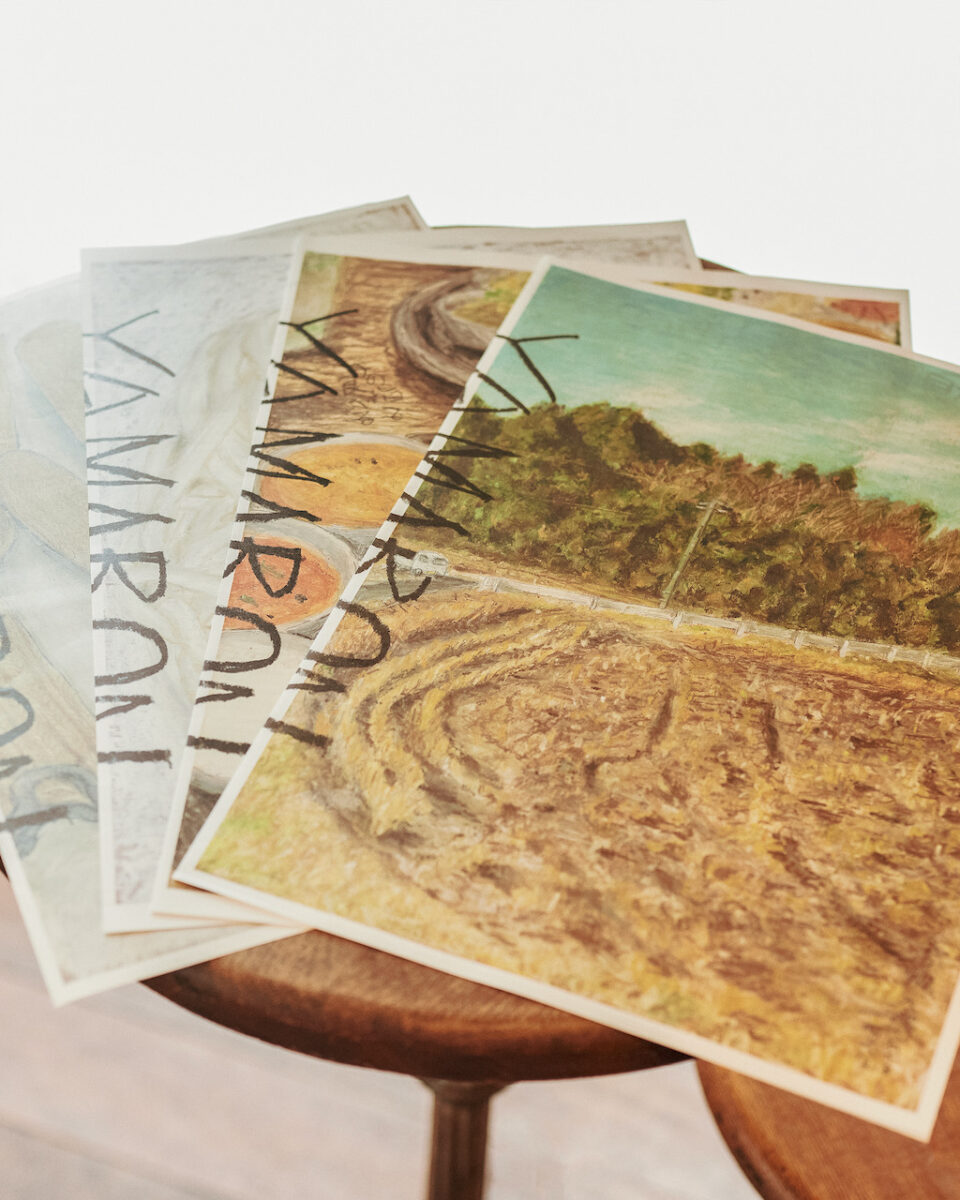
It has been seven years since he started his coffee shop. What Yamamoto wants to do is no longer limited to roasting. He sometimes opens a pop-up store at an event and meets new people or visits coffee-producing areas and gets in touch with the producers and becomes familiar with their local lifestyles. Regardless of the industry they are in, he interviews people that he is interested in, and sends out information on free papers and podcasts. As his interest in free papers and podcasts gradually expanded, Yamamoto was faced with a challenge.
“It costs a lot of money to visit producers overseas and produce high-quality free papers. Since we don’t have a solid financial base for that, we can’t put that much money there. For us to continue to be independent not being influenced by the surrounding circumstance every time, it’s not enough to do just roasting. I need to train people who can roast coffee and I need to have the right staff at the store. In short, I have to acquire management skills.”
Yamamoto is always in pursuit of freedom, but it’s not because he has lived a free and easy life. As the vice president of the shopping district where his store is located, he spends a lot of time working to maintain and revitalize the shopping district.
“I go out into the communities a lot, but it’s like a trip. I still think of the local customers first and foremost. I believe that having a safe home ground is important more than anything, so I chose a place for my coffee shop to be located where I could easily put down roots.”

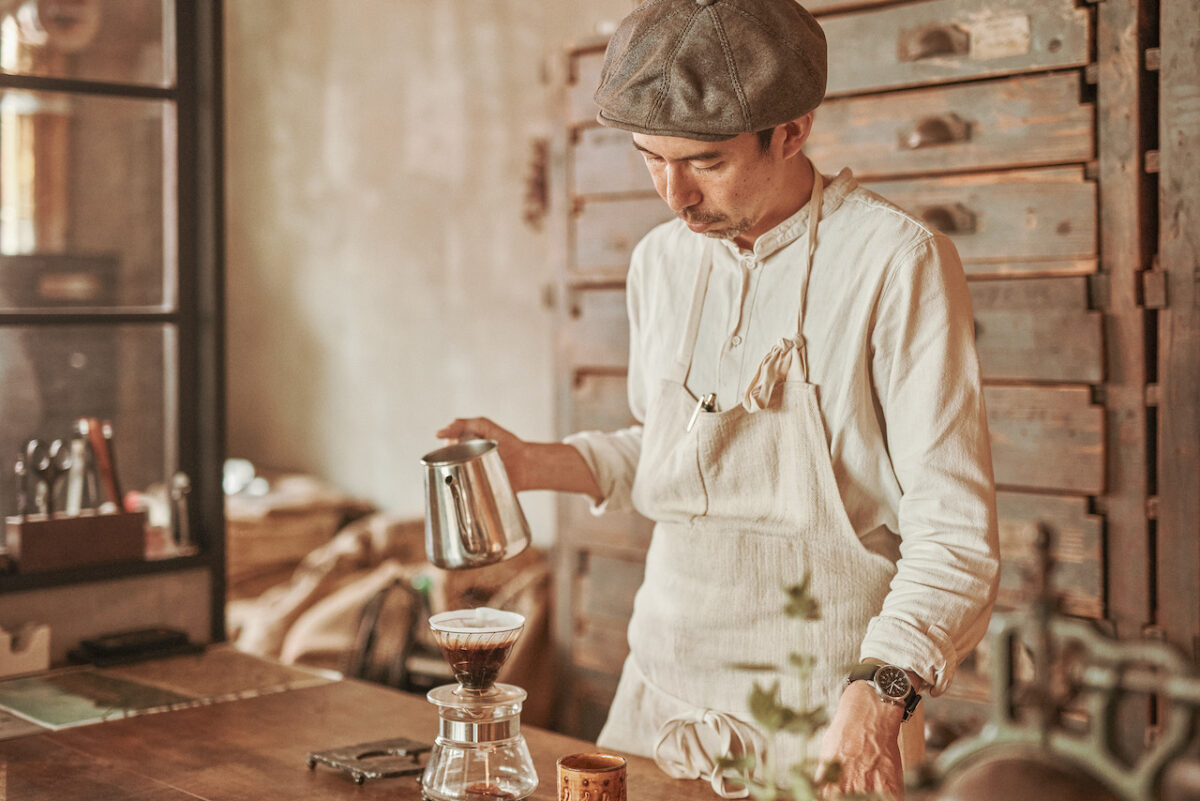
I have coffee in my life.
To the casual observer, Yamamoto seems to be in a state of flux, but he says that he has been reminded of the appeal of coffee through initiatives such as producing free papers and sending out messages via podcasts, which are often unrelated to the topic of coffee.
Yamamoto states, “The interesting part is that I can meet people who match the level that I have reached with coffee. So, I think the greater my own knowledge of coffee, the greater the knowledge of coffee among the people I meet will be.”
“There were times when I felt self-conscious thinking that I couldn’t talk about anything worthwhile because I had lived a life with no particular hardships, but then I realized that I could be on the same level by talking about coffee, which I have been involved in for about twenty years.”
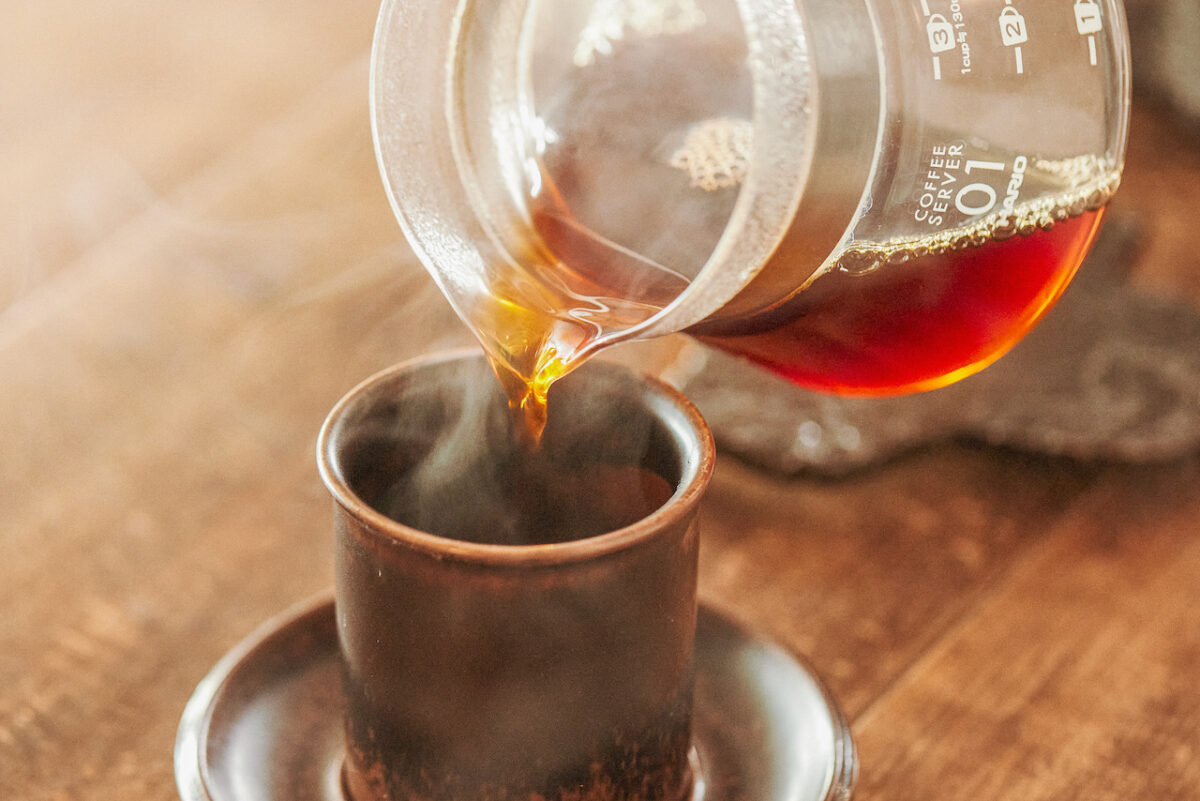
There was a memorable moment when Yamamoto felt the new potential of coffee. When he made a special blend coffee to go with a movie called “Gyakkou,” which means “backlighting” in Japanese, set in the 1970s Onomichi in Hiroshima Prefecture, he received an unexpected response.
“As the title of the film suggests, the film was characterized by light, some of it sparkling and some of it dull. To recreate that image of the lights, I made the coffee with such a taste with the store staff and offered it to the director and screenwriter to drink. They said, ‘It tastes just like the film itself!’ and ‘This is like an official trailer!’ They were very impressed and said, ‘If you drink this coffee while watching the movie, it’s a perfect match!’ ”
“The special blend coffee they chose was made by the staff at our store, and I realized that coffee can also be used as a theme song. The theme of the film had nothing to do with coffee, but I guess they could communicate with each other because they were also creative people. Since we started communicating with them at the same level of creative understanding, our trust in each other increased and the excitement was unique. And it’s a feeling that not only we, but everyone who has seen the film can understand.”
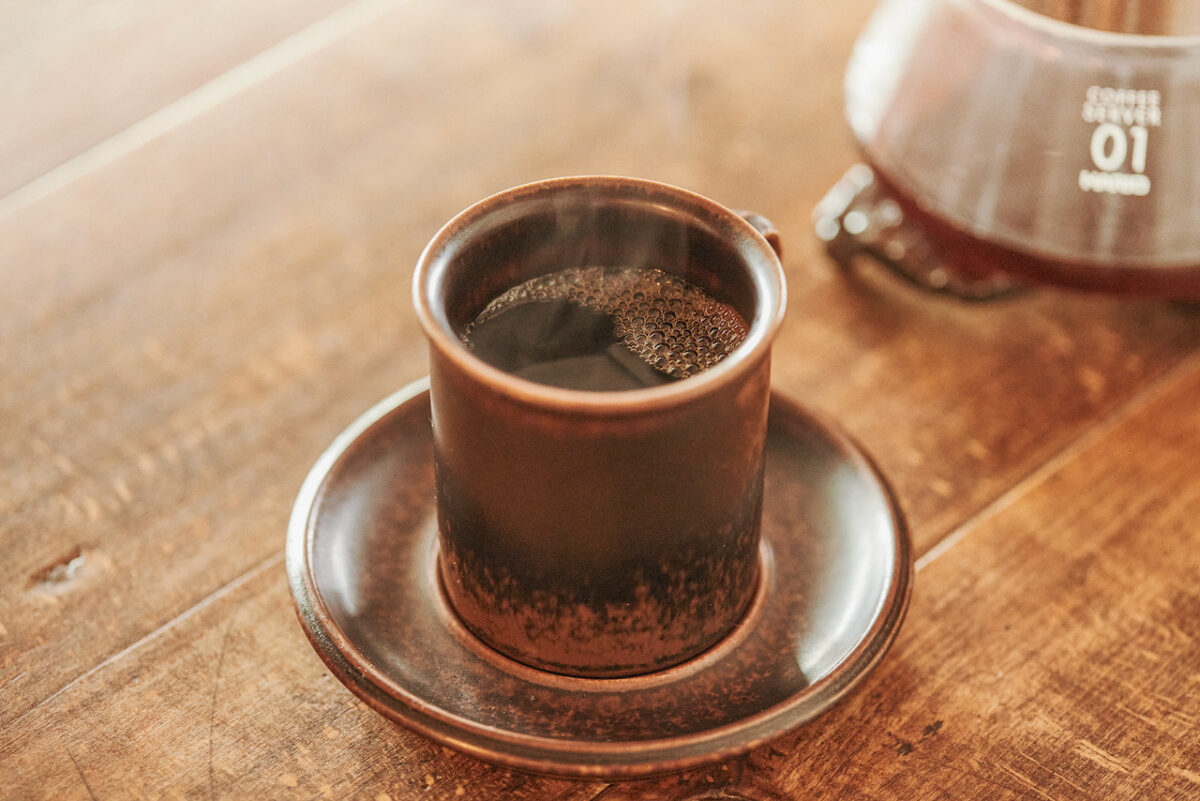
Aya Watanabe, who wrote the screenplay for “Gyakkou,” wrote about the excitement she felt at that moment.
Watanabe said, “I’ve been working as a screenwriter for twenty years now. I’ve never had such a wonderful experience. I’m not a coffee expert, but I was surprised and happy that I could imagine that the coffee tastes like the film so clearly. I was really impressed but for some reason I couldn’t find the right words to express it.”
“When Yamamoto san (Mr. Yamamoto) told me that he made coffee for the film because he wanted to express his impressions of the film, and he could express it better with coffee than with words, I realized that coffee is indeed a language for Yamamoto san. It seemed natural for me to be speechless being impressed by the coffee he made even though I don’t speak the language of coffee.” (Instagram「gyakkofilm」)
Yamamoto also recalls, “It was the moment I became sure that I am happy to be a coffee shop owner and I will always want to be a coffee shop owner. In the past few years, as I have felt the potential of coffee more and more, I am determined more than ever to want to continue my work in a coffee shop.”
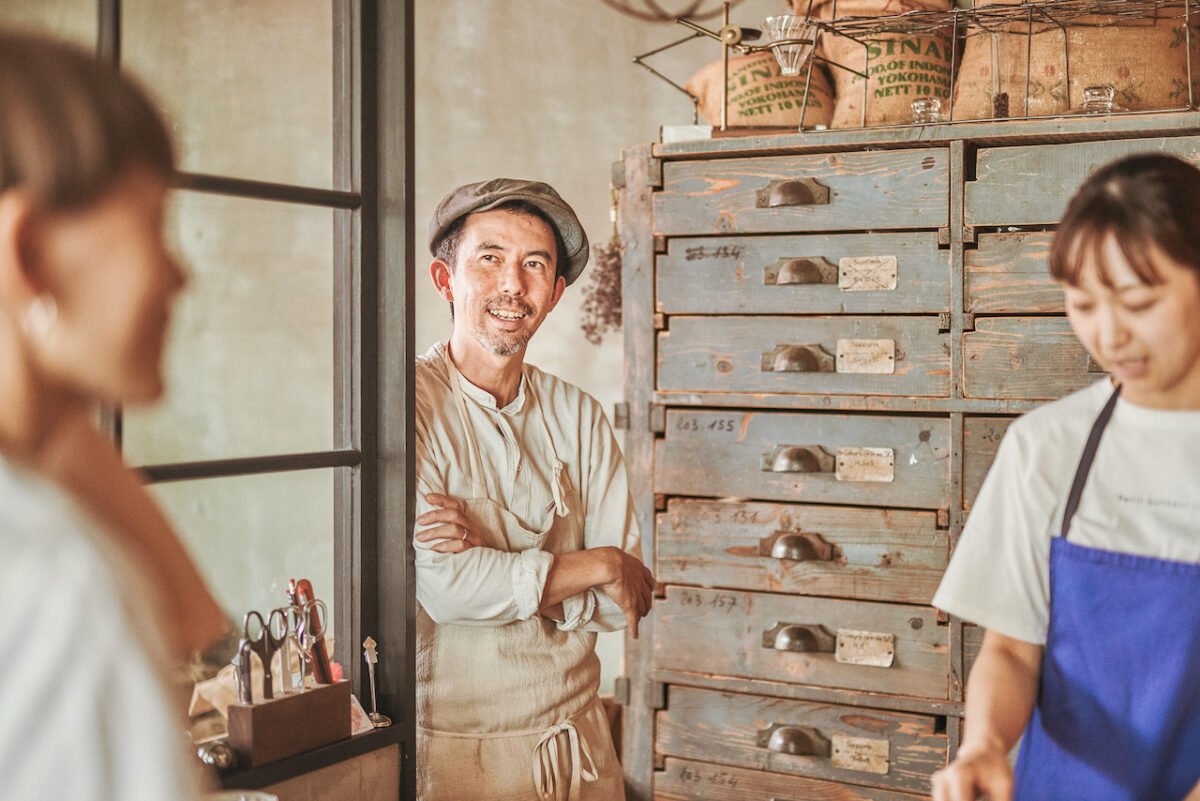
For Yamamoto, coffee is ultimately a means to meet people, talk with people, and connect with people. Yamamoto’s life is full of possibilities as he turns 40 and as he continues to travel with coffee, his “partner” in life.
Yamamoto states, “Coffee is the second largest product after petroleum in the global market. I hear that there are a lot of people working in the coffee industry around the world. When I think about the scale of the world coffee market, I feel that I can connect with anyone through coffee and eventually meet the people I wish to meet. I can’t help but feel that way.”
Originally written in Japanese by Tatsuya Nakamichi.
MY FAVORITE COFFEE人生を豊かにする「私の一杯」
“My favorite coffee is a cup of coffee I drink with the staff prepared by roasting coffee beans I’ve purchased for the first time. It’s nice to be able to share the excitement of wondering together what kind of taste and reaction we will encounter as well as experiencing the joy of having a good cup of coffee with everyone.”
